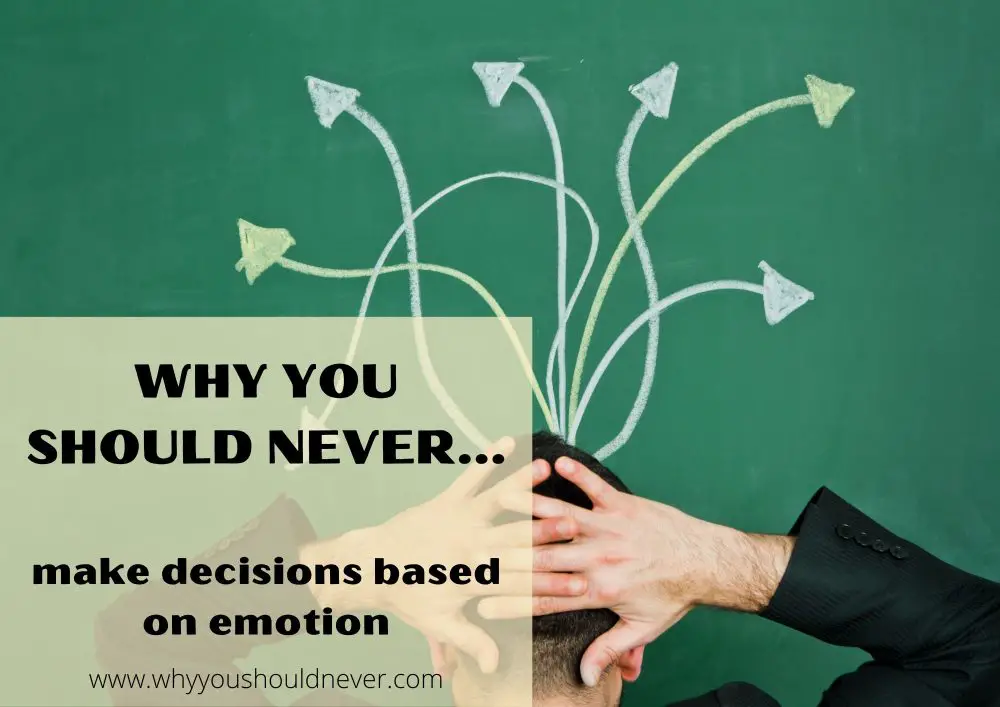![]()
Why You Should Never Make Decisions Based On Emotion
In our fast-paced, constantly-connected world, it’s easy to get caught up in the heat of the moment and make a decision based on emotion.
Whether it’s something as small as splurging on a new outfit because you’re feeling low, or something as major as quitting your job because you’re angry with your boss, we’re willing to bet that you’ve made a decision based on your emotions at least once in your life.
And while making decisions based on emotion can sometimes lead to short-term gratification, in the long run, it’s always best to avoid letting your emotions guide the major choices in your life. Let’s take a look at why you might want to rein in your emotions before you make a life-changing decision.
7 reasons why you shouldn’t make decisions based on emotion
1. Emotions are fleeting
As human beings, we are constantly bombarded with emotions. On any given day, we may feel happiness, sadness, anger, fear, love, and everything in between.
And while it’s perfectly natural to experience a range of emotions, it’s important to remember that they are all temporary. Just because you’re feeling angry or sad at the moment doesn’t mean those emotions will last forever.
If you make a decision based on your current emotional state, you may end up regretting it later when your emotions have changed.
2. Emotions can be misleading
In addition to being temporary, emotions can also be misleading. When we’re feeling upset, it’s easy to believe that the situation is worse than it actually is.
For instance, if you get into a fight with your significant other, you may be so angry in the moment that you decide to break up with them, even though the fight was just a minor disagreement.
Or, if you’re feeling sad and lonely, you may convince yourself that nobody loves you, even though there are people in your life who care about you deeply.
It’s important to remember that emotions can distort our perception of reality and prevent us from making rational decisions.
3. Emotions can cloud your judgment
When you’re feeling emotional, it’s hard to think clearly and make logical decisions.
That’s because the part of your brain responsible for higher-level thinking, known as the prefrontal cortex, becomes less active when you’re experiencing strong emotions.
At the same time, the limbic system, which is responsible for processing emotions, becomes more active. This can lead to impulsive decision-making and rash behavior.
So, if you’re ever in a situation where you need to make an important decision, it’s best to step away from the situation and allow yourself to calm down before making any decisions.
4. Emotions can cause you to act impulsively
As we mentioned above, when you make decisions based on your emotions, you’re more likely to act impulsively without thinking things through.
You’re much more likely to do or say things you wouldn’t normally do if you’re angry, sad, or afraid. And while it may feel good in the moment to act on your impulses, you could be making a situation much worse.
5. Emotions can lead to regretful decisions
This is always a real danger when making decisions based on emotions. If you make a decision while you’re angry or upset, you may end up regretting it later when you’ve had time to calm down and think things through.
For instance, if you get into a fight with your best friend and decide to end the friendship, you may realize later that you miss them and want to patch things up.
6. The decision you make might be irreversible
Continuing on from the previous point, sometimes the decisions we make based on our emotions are irreversible.
If you make a decision that you later come to regret, you may not be able to undo the damage. The best friend you so callously dumped may not be willing to forgive you and take you back.
Or, if you make an impulsive purchase while feeling stressed or sad, you may be stuck with the item even if you can’t afford it or don’t really need it.
7. People will find it hard to trust or rely on you
If you’re known for making decisions based on your emotions, people will find it hard to trust you; they’ll never know when you might do or say something impulsive. As a result, they may avoid confiding in you or sharing important information with you.
Final Word
As you can see, there are many dangers associated with making decisions based on your emotions. It’s almost always a bad idea to let your emotions guide your decisions.
If you find yourself in a situation where you need to make an important, life-changing decision, take a step back and try to evaluate the situation objectively. Once you’ve calmed down, you’ll be able to think more clearly and make a decision that you won’t later regret.
